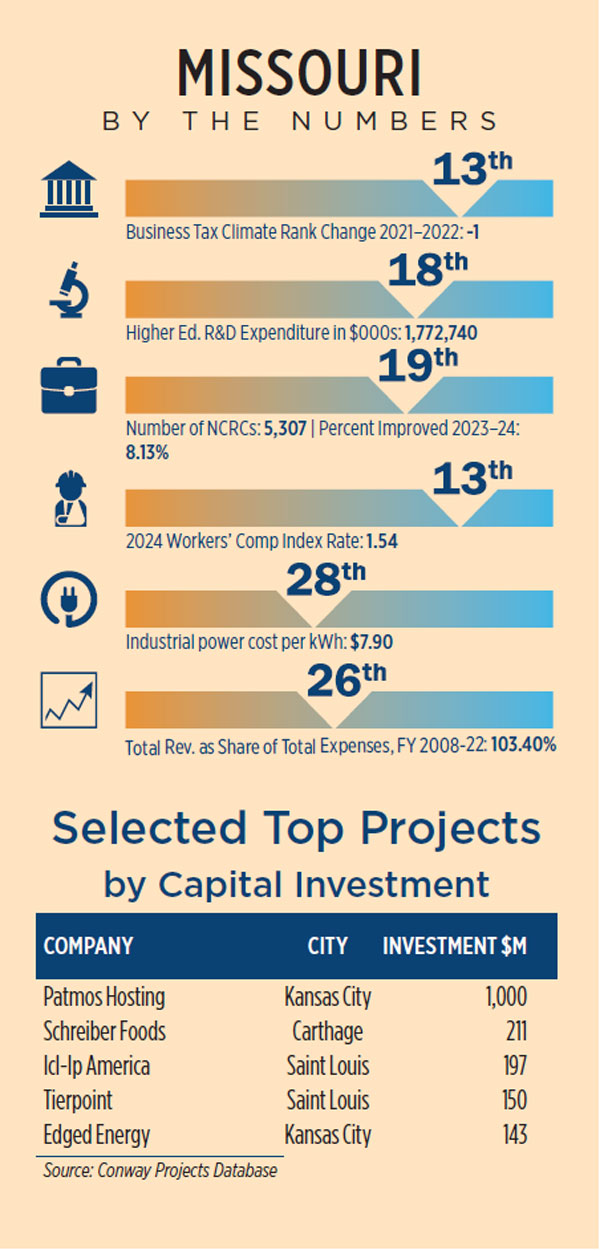All 50 U.S. states are involved in some level of agricultural production, resulting in a total gross production value of over $534 billion in 2024 alone. Industry-leading states such as California and Texas hold their own well, but in a Midwest region dominated by agriculture, Missouri is bringing its ecosystem to the next level.
The state has a roster of nearly 90,000 farms and more than 500 food and beverage companies, including global heavyweights Anheuser-Busch, Cargill, General Mills, Kraft Heinz and Tyson Foods. These manufacturers reap the benefits of a full production lifecycle, as high-quality raw materials are in steady supply. Meanwhile, the state’s geographic positioning and transportation infrastructure that allows products to move by air, rail, water or road fulfills the needs of domestic and international distribution.
Since January 2024, Missouri has secured 21 new food and beverage project investments totaling over $537 million across the state. Project details place an emphasis on manufacturing operations, a majority of which focused specifically on expansion. Recent May 2025 announcements include a $95 million expansion from Daily’s Premium Meats in Saint Joseph, north of Kansas City along the Missouri River, and Conagra Brands’ $29.1 million expansion in Macon, located halfway across the state from St. Joe along U.S. Highway 36, known as the Way of American Genius because of its ties to creative individuals (Mark Twain, Walt Disney) and unique innovations.
Decades of industry growth and expertise moving into the state naturally led to the cultivation of a rich agricultural and biotech industry ecosystem that has connected Missouri researchers, scientists, farmers, manufacturers and
educators. The added advantage of being within 500 miles of where over half of the nation’s food production is concentrated has introduced unique opportunities for the state.
St. Louis has become a pillar of research and innovation within the state’s thriving agricultural ecosystem. The region has accumulated the highest number of plant scientists on the globe, driven by assets such as the Missouri Botanical Garden and the Donald Danforth Plant Science Center, which is the largest independent plant research institute in the world. Combined with strategic developments like the 600-acre 39 North agricultural technology and biosciences innovation district and the 200-acre Cortex Innovation District designed for biotech and life sciences research, St. Louis is a playground for the curious.
Next Generation Exploration
Washington University in St. Louis (WashU) is taking a new approach to tackling global challenges associated with agricultural production, food distribution and access to quality nutrition. The April 2025 introduction of WashU’s new Food and Agriculture Research Mission (FARM) laid a new foundation to foster research and collaboration in the region.
“St. Louis and its surrounding areas are well known nationally and internationally for excellence in agricultural research and innovation, particularly in plant and biosciences,” says WashU FARM Director Morven McLean. “The region has a deep bench of talent, expertise and experience that runs from blue-sky, big ideas research in leading academic institutions such as Washington University to small intensely creative startups to some of the biggest international players.”
She says this connectivity has led to a number of innovative products, practices and services that provide social, economic, health and environmental benefits locally, regionally and globally. The concept of FARM was advanced during a Food Futures symposium convened at the university in March 2024, which focused on such topics as food access, affordability, quality and sustainability. Issues derived from conversations held at Food Futures helped mold FARM’s emerging strategy.
Housed in WashU’s School of Public Health, FARM represents the first of six planned Innovation Research Networks (IRN) being introduced to the university. The concept of IRNs has been in development for some time as the School of Public Health aimed to deepen connections between academic and community partners to drive new research.

“These are dynamic research hubs that will both imagine and respond to frontiers in public health research, situating interdisciplinarity at their core,” McLean continues. “So FARM is part of that collaborative ecosystem, comprised of researchers in the School of Public Health, as well as from WashU’s other schools, but also engaging with researchers, practitioners and leaders from the communities that we work with and serve.”
Students attending the research-intensive university already benefit from engaging in a diverse range of research initiatives that provide the space to explore, develop and push the boundaries of how WashU creates and uses knowledge and data to impact the world. Through FARM, these students will delve into research areas such as mitigation and management of food waste and loss; developing tools that provide decision-making support for sustainable agriculture and food system policies and practices; improving rural health to positively impact food system transformation; and nutrition and agricultural biodiversity.
One month after its launch, FARM announced the introduction of its FARM Cultivate Grants Fund. The program’s first move aims to kickstart research for practical, scalable innovations across agriculture, food systems and public health with an emphasis on sustainability. The grant program features two tracks — the first catering to early-career investigators and the second designed for established interdisciplinary teams pursuing rigorous preliminary investigations. Track 1 provides up to $40,000 for one year of research, while Track 2 awards up to $250,000 for two to three years of research. Applications for grant funding are currently still open with the first round of recipients expected to be announced later this year.
“FARM is a new initiative, launched just a few months ago, but we are already benefiting from St. Louis’ amazing R&D and practice culture,” says McLean. “There’s a prevailing spirit of collaboration and cooperation, and collective pride in the progress and successes that happen — whether in research or starting and growing new businesses.”

